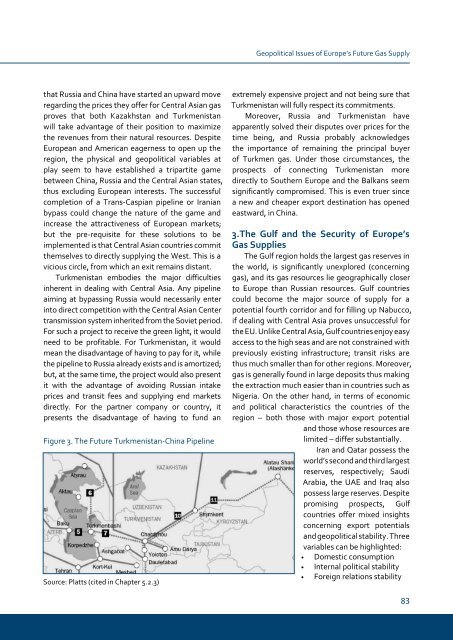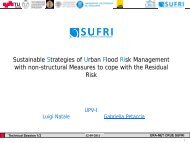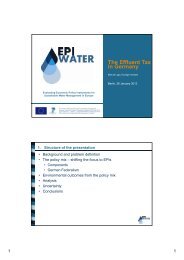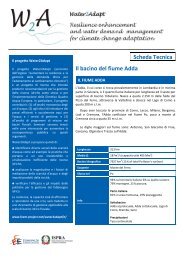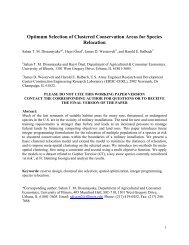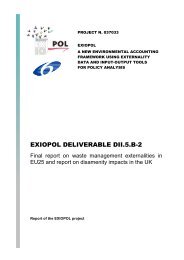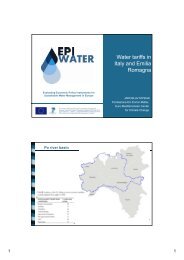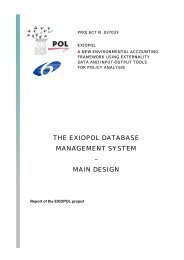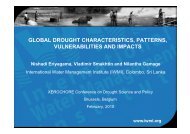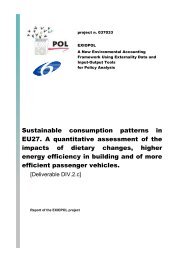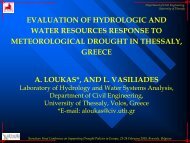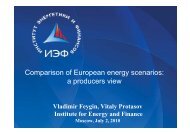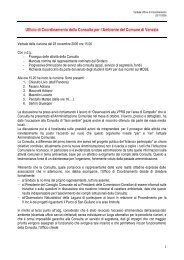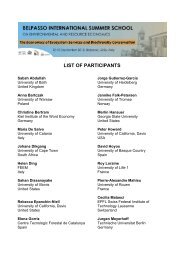Gulf and European Energy Supply Security - Feem-project.net
Gulf and European Energy Supply Security - Feem-project.net
Gulf and European Energy Supply Security - Feem-project.net
You also want an ePaper? Increase the reach of your titles
YUMPU automatically turns print PDFs into web optimized ePapers that Google loves.
that Russia <strong>and</strong> China have started an upward move<br />
regarding the prices they offer for Central Asian gas<br />
proves that both Kazakhstan <strong>and</strong> Turkmenistan<br />
will take advantage of their position to maximize<br />
the revenues from their natural resources. Despite<br />
<strong>European</strong> <strong>and</strong> American eagerness to open up the<br />
region, the physical <strong>and</strong> geopolitical variables at<br />
play seem to have established a tripartite game<br />
between China, Russia <strong>and</strong> the Central Asian states,<br />
thus excluding <strong>European</strong> interests. The successful<br />
completion of a Trans-Caspian pipeline or Iranian<br />
bypass could change the nature of the game <strong>and</strong><br />
increase the attractiveness of <strong>European</strong> markets;<br />
but the pre-requisite for these solutions to be<br />
implemented is that Central Asian countries commit<br />
themselves to directly supplying the West. This is a<br />
vicious circle, from which an exit remains distant.<br />
Turkmenistan embodies the major difficulties<br />
inherent in dealing with Central Asia. Any pipeline<br />
aiming at bypassing Russia would necessarily enter<br />
into direct competition with the Central Asian Center<br />
transmission system inherited from the Soviet period.<br />
For such a <strong>project</strong> to receive the green light, it would<br />
need to be profitable. For Turkmenistan, it would<br />
mean the disadvantage of having to pay for it, while<br />
the pipeline to Russia already exists <strong>and</strong> is amortized;<br />
but, at the same time, the <strong>project</strong> would also present<br />
it with the advantage of avoiding Russian intake<br />
prices <strong>and</strong> transit fees <strong>and</strong> supplying end markets<br />
directly. For the partner company or country, it<br />
presents the disadvantage of having to fund an<br />
Figure 3. The Future Turkmenistan-China Pipeline<br />
Source: Platts (cited in Chapter 5.2.3)<br />
Geopolitical Issues of Europe’s Future Gas <strong>Supply</strong><br />
extremely expensive <strong>project</strong> <strong>and</strong> not being sure that<br />
Turkmenistan will fully respect its commitments.<br />
Moreover, Russia <strong>and</strong> Turkmenistan have<br />
apparently solved their disputes over prices for the<br />
time being, <strong>and</strong> Russia probably acknowledges<br />
the importance of remaining the principal buyer<br />
of Turkmen gas. Under those circumstances, the<br />
prospects of connecting Turkmenistan more<br />
directly to Southern Europe <strong>and</strong> the Balkans seem<br />
significantly compromised. This is even truer since<br />
a new <strong>and</strong> cheaper export destination has opened<br />
eastward, in China.<br />
3.the <strong>Gulf</strong> <strong>and</strong> the security of europe’s<br />
Gas supplies<br />
The <strong>Gulf</strong> region holds the largest gas reserves in<br />
the world, is significantly unexplored (concerning<br />
gas), <strong>and</strong> its gas resources lie geographically closer<br />
to Europe than Russian resources. <strong>Gulf</strong> countries<br />
could become the major source of supply for a<br />
potential fourth corridor <strong>and</strong> for filling up Nabucco,<br />
if dealing with Central Asia proves unsuccessful for<br />
the EU. Unlike Central Asia, <strong>Gulf</strong> countries enjoy easy<br />
access to the high seas <strong>and</strong> are not constrained with<br />
previously existing infrastructure; transit risks are<br />
thus much smaller than for other regions. Moreover,<br />
gas is generally found in large deposits thus making<br />
the extraction much easier than in countries such as<br />
Nigeria. On the other h<strong>and</strong>, in terms of economic<br />
<strong>and</strong> political characteristics the countries of the<br />
region – both those with major export potential<br />
<strong>and</strong> those whose resources are<br />
limited – differ substantially.<br />
Iran <strong>and</strong> Qatar possess the<br />
world’s second <strong>and</strong> third largest<br />
reserves, respectively; Saudi<br />
Arabia, the UAE <strong>and</strong> Iraq also<br />
possess large reserves. Despite<br />
promising prospects, <strong>Gulf</strong><br />
countries offer mixed insights<br />
concerning export potentials<br />
<strong>and</strong> geopolitical stability. Three<br />
variables can be highlighted:<br />
• Domestic consumption<br />
• Internal political stability<br />
• Foreign relations stability


